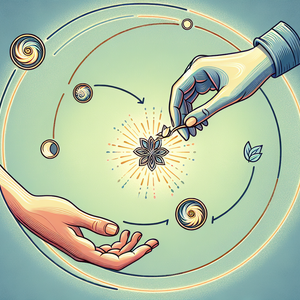The Human Touch in Healing: Why Empathy Will Always Matter

Recreational therapy is an essential yet often underappreciated branch of healthcare that focuses on improving patients’ quality of life through creative and meaningful activities. Unlike traditional medical interventions, recreational therapy is centered on holistic healing—addressing emotional, social, and physical well-being. This therapeutic approach often includes activities such as art, music, dance, outdoor recreation, or group games, all tailored to the needs of individuals or groups. For instance, a stroke survivor might regain fine motor skills by participating in painting sessions, or a child with autism might build social skills through structured play. Recreational therapists also play a critical role in addressing loneliness and depression in elderly patients by organizing group activities or simply being a source of companionship. What sets recreational therapy apart is not just the activities themselves but the empathetic and personalized care that therapists bring to the table. Research has continually demonstrated the importance of human connection in healing. A study published in Health Psychology found that higher levels of social support correlated with faster recovery rates and improved health outcomes. Recreational therapists, with their ability to engage patients on a deeply personal level, act as both healers and companions, creating a therapeutic environment that fosters emotional and physical recovery. These aspects of care are inherently human and cannot be automated by machines.
The Limitations of AI in Emotional Connection
AI and automation are undoubtedly transforming healthcare in remarkable ways. Algorithms can detect diseases earlier than human doctors, wearable devices can monitor vital signs in real time, and virtual assistants can remind patients to take their medications. In mental health care, AI-powered chatbots like Woebot or Wysa are being used to provide basic counseling services or emotional support. While these tools are useful, they have significant limitations when it comes to emotional intelligence and empathetic care. Machines, no matter how advanced, operate on data and predefined algorithms. They cannot understand the nuances of human emotions, body language, or the contextual subtleties that shape interpersonal interactions. A chatbot might be programmed to say, “I’m sorry to hear that,” when a patient shares a difficult emotion, but it cannot replicate the warmth of a therapist’s tone, the comfort of a reassuring touch, or the intuitive adjustments a human would make in response to non-verbal cues. Consider a patient recovering from a traumatic accident who feels defeated during therapy. A recreational therapist might notice subtle signs of distress, like a change in posture or a lack of engagement, and respond with words of encouragement or modify the activity to lift the patient’s spirits. Such adaptive, empathetic responses require emotional intelligence, a uniquely human trait that AI lacks. Machines can simulate empathy, but they cannot feel it.
Empathy as the Cornerstone of Healing
Empathy is not just a “nice-to-have” skill in therapeutic practices—it is the foundation of healing. True empathy involves understanding another person’s emotions and experiences and communicating that understanding in a way that builds trust and connection. This emotional safety often motivates patients to engage more fully in their therapy, leading to better outcomes. Take, for example, the role of recreational therapists in long-term care facilities. Elderly residents often face feelings of loneliness, which can lead to depression, anxiety, and even physical decline. While an AI companion might be programmed to hold basic conversations or remind a resident to take their medication, it cannot replace the human warmth of a therapist who listens to stories, shares in laughter, or simply holds a hand during a difficult moment. These simple yet profound acts of empathy create a sense of belonging and purpose, which is essential for emotional and physical recovery. Similarly, in mental health care, empathy helps patients feel understood and valued, which is critical for building trust. A recreational therapist working with a child who has experienced trauma might use creative activities like drawing or storytelling to help the child process their emotions. The therapist’s ability to respond with compassion and patience is what makes the process healing—not just the activity itself.
The Balance Between Technology and Humanity
To suggest that AI and automation have no place in therapy would be shortsighted. On the contrary, technology can significantly enhance therapeutic practices when used alongside human care. For example, virtual reality (VR) has been used to help patients with post-traumatic stress disorder (PTSD) confront and process their fears in a controlled environment. Data analytics can provide therapists with insights into a patient’s progress, allowing for more tailored interventions. Wearable devices can monitor physical activity and provide real-time feedback, helping therapists design more effective treatment plans. However, these technological advancements should be seen as tools that complement, not replace, the human element. The best outcomes arise when therapists integrate technology into their practice without losing sight of their core mission: to connect with and uplift others. The synergy between the efficiency of AI and the irreplaceable qualities of human empathy creates a future where patients receive the best of both worlds.
As we navigate a future increasingly shaped by AI and automation, it’s easy to imagine a world where machines take over even the most human-centric roles. However, when it comes to healing, the human touch remains irreplaceable. Recreational therapists embody the profound impact of empathy, emotional intelligence, and genuine connection—qualities that no algorithm can replicate. Whether it’s through a compassionate word, a shared laugh, or a moment of understanding, these therapists remind us that some aspects of care will always require a human heart. While technology can enhance and streamline therapeutic practices, it is empathy that truly heals. In a world that often feels disconnected, the role of recreational therapists is not just important—it’s essential. As we embrace the possibilities of AI, we must also protect the uniquely human qualities that make healing possible. The future of healthcare is not a choice between technology and humanity—it is a partnership where both work together to ensure the best outcomes for patients.
Recreational Therapist
Long-term care facilities, rehabilitation centers, and hospitals
Responsibilities
Design and implement therapeutic activities such as art, music, or physical recreation tailored to patient needs.
Provide emotional support and build trust with patients, fostering a sense of belonging and purpose.
Collaborate with healthcare teams to assess patient progress and adjust therapy plans as needed.
Child Life Specialist
Pediatric hospitals, oncology centers, and outpatient clinics
Responsibilities
Support children and families in healthcare settings by reducing anxiety through play, education, and emotional support.
Use therapeutic techniques like storytelling, art, and role-playing to help children process medical experiences.
Advocate for pediatric patients’ emotional and developmental needs within interdisciplinary medical teams.
Geriatric Counselor
Assisted living facilities, hospice care organizations, and private practices
Responsibilities
Provide therapy and emotional guidance to elderly patients experiencing loneliness, grief, or mental health challenges.
Design individualized care plans that address cognitive decline, depression, or anxiety in aging populations.
Work closely with families, caregivers, and medical staff to create a supportive care environment.
Occupational Therapist (Specializing in Neurological Rehabilitation)
Rehabilitation hospitals, outpatient clinics, and neuro-recovery centers
Responsibilities
Help patients recovering from strokes, brain injuries, or neurological disorders regain daily living skills.
Develop and oversee therapy plans that include fine motor skill development and cognitive exercises.
Incorporate assistive technologies or adaptive equipment to improve patient independence.
Behavioral Health Program Coordinator
Community mental health organizations, schools, and healthcare systems
Responsibilities
Oversee mental health or wellness programs, ensuring they meet the emotional and psychological needs of patients.
Manage a team of therapists or counselors and coordinate treatment plans tailored to specific patient groups.
Analyze patient outcomes and program effectiveness using data to improve care quality.


